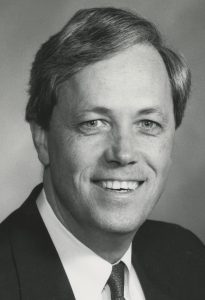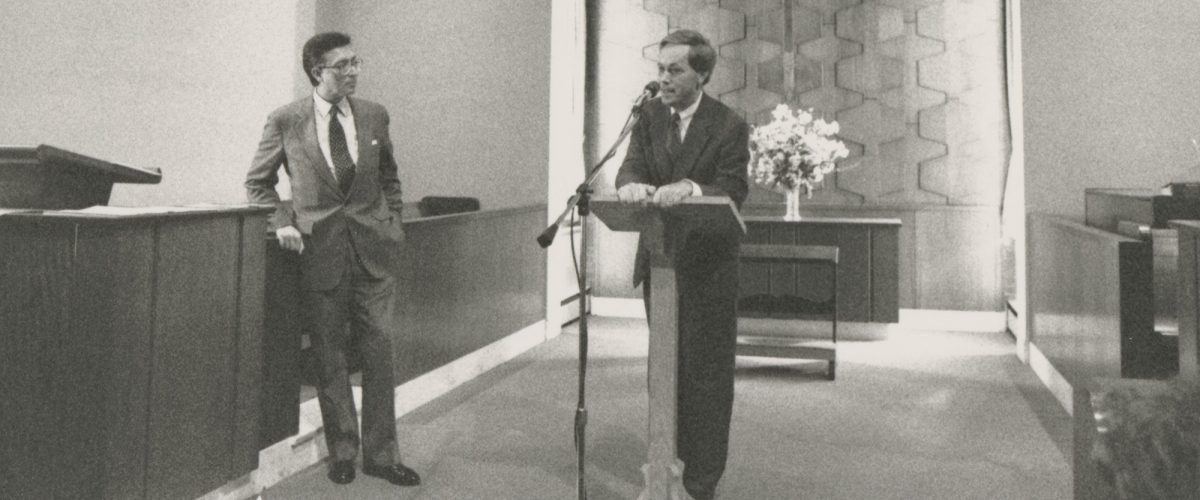With the passing of Baptist educator and pastor Tom Graves this week, our friends at the Virginia Baptist Historical Society located the following transcript of an acceptance speech given by Graves on Jan. 31, 1991, when he was named president of the newly created Baptist Theological Seminary at Richmond. It is published below verbatim.
It is with a sense of joy and humility that I have accepted the invitation of the trustees to serve as the president of the Baptist Theological Seminary of Richmond. I made this decision with a sense of intense personal dedication to the dreams of this school but more importantly, I made this decision with a sense of clear spiritual direction. With excitement I can say, “This I must do.”

Tom Graves (Photo courtesy Virginia Baptist Historical Society)
Let me begin by expressing my appreciation to the trustees, chaired by Mary Strauss, and the search committee, chaired by Alan Neely, for their guidance and care in the past several weeks. Also a word of thanks must be expressed to the entire Development Council for their fine work, especially in the last few months. Most of all, I would want to recognize publicly my indebtedness to Morris Ashcraft, who has guided this institution so well in its formative stages. His advice and counsel have been and will continue to be valued.
The focus of our meeting, the real story of the day, is not so much my coming to Richmond. The importance of this day is that the trustees are announcing with certainty that there will be established in Richmond a new seminary for the training of Baptist ministers. This is no longer just a dream, a wish or a plan. This is now an exciting reality.
“This is no longer just a dream, a wish or a plan. This is now an exciting reality.”
There are two important reasons why this decision of the trustees is good news for Baptists in this region. First, there is a need for a school where Baptist ministers can receive quality education. The enrollment of students at other Baptist seminaries has plunged in a precipitous manner due to our denominational fights.
When you ask the question, where have these students gone, the fact is, the rising population of Baptist students in other institutions has not kept pace with the decrease of students in our own seminaries. We are losing an entire student generation! The 1,500 Southern Baptist churches in Virginia and the 3,500 churches of North Carolina in addition to the other congregations of this region must have a place to which they can turn for their future leadership. I cannot believe that churches such as the one I will leave next month will turn to fundamentalist dominated institutions for their future leadership.
It is the churches of this area that are at stake, and it is their future that is at risk in this venture.
Second, the preservation of our Baptist heritage demands the formation of new institutions in which our Baptist ideals are honored. Baptists have not offered much that is entirely unique to the world religious scene. The one clear thing we have bequeathed to the Christian tradition is an undying allegiance to religious freedom: a free conscience, in a free church, in a free state. From the very beginning being Baptist has meant being free.
Virginians know that better than anyone else. More importantly they practice that more than anyone else. But now those ideals of freedom are forgotten, denied and attacked by forces at work within the old structures of Southern Baptist life. With the imposition of fundamentalist documents as guidelines for teaching in our schools, with the muzzling of our denominational press, with the focus of our concern on creedal conformity rather than world missions, all resemblance between current Southern Baptist life and traditional Baptist ideals has been lost.
“We can no longer trust our denomination to keep alive our cherished Baptist traditions.”
We can no longer trust our denomination to keep alive our cherished Baptist traditions. That can only be done with the establishment of new institutions which are based, not on narrow creedalism, but on an appreciation for the key Baptist distinctive of Christian freedom.
For the sake of who we are and what we have been, these times demand of us courageous action to assure that somewhere the ideals of Baptist life will be cherished, nurtured and spread.
The Baptist Theological Seminary of Richmond is one such institution.
What I have said so far places the formation of this seminary within the context of the battles raging within our Southern Baptist denomination. But it should be said as clearly as possible that this school is not just a reaction to denominational fighting. What has been born in Richmond is worthy of life regardless of what is going on in Baptist circles. We have the opportunity here to capture a whole new vision of Christian ministry. Here is a chance to move beyond anything we have experienced before in Baptist theological education.
In Richmond we are very privileged to operate within the prestigious fellowship of the Richmond Theological Consortium. This means that we are pledged to cooperate in creative ways with our brothers and sisters of other denominations and other races. This ecumenical and inter-racial dimension of the school allows ministers to be trained in the same environment in which they will live out their ministry. The days of parochial education for ministry are over.
Also, the trustees have made a crucial commitment to inclusive theological education. That means we will honor God’s call to all persons regardless of gender, and that applies to students, faculty and staff. This inclusiveness means that the seminary will have at its very heart a concern for global issues and international missions.
The trustees have also committed themselves to new avenues of ministerial education such as an emphasis upon parish-based training and hands-on experience in missions. Very importantly to me, the seminary has also recognized the need for an emphasis upon spiritual formation for students and faculty alike.
The plans for the school are well conceived. The dreams for the school are visionary. The need for the school is obvious. Our task is to wed dreams and hard work in order to meet the needs of Baptists.
I am encouraged by the prospect of working with Virginia Baptists and others in this region. I am confident of my decision. And I am hopeful as we plan for the future.
Related articles:
Thomas Graves, founding president of BTSR
The man with a servant’s towel | Opinion by Linda McKinnish Bridges
Baptist Theological Seminary at Richmond to close in 2019


